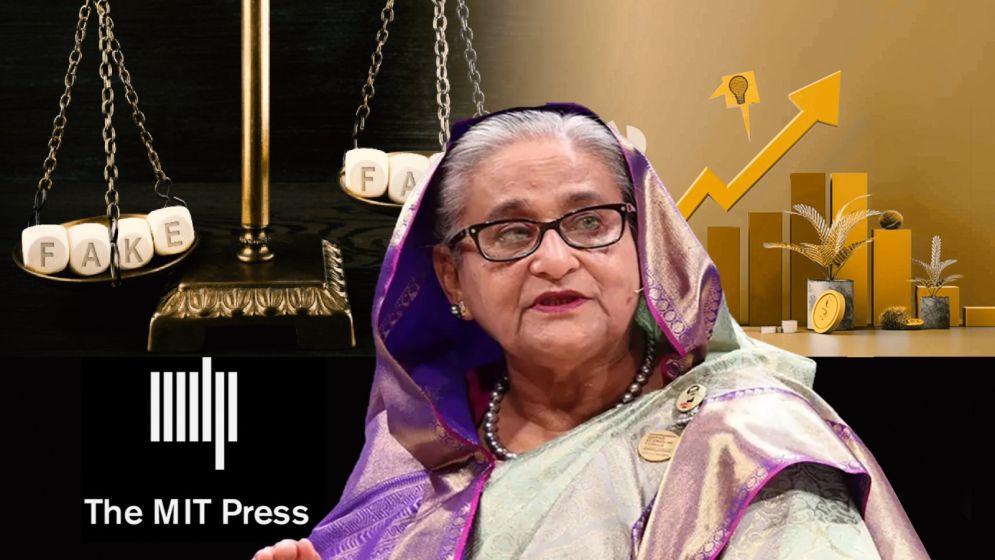MIT Press’s 2021 Special Journal on Bangladesh: A dangerous whitewash of Hasina's authoritarian rule

In the Fall of 2021, the Innovations: Technology, Governance, Globalization journal, published by the Massachusetts Institute of Technology (MIT) Press, released a special issue commemorating Bangladesh's 50 years of independence.
The issue featured several distinguished contributors, including Nobel laureate and Harvard University professor Amartya Sen, former World Bank Chief Economist Kaushik Basu, and Iqbal Z. Quadir, the founder of Grameenphone.
However, it was the inclusion of Sheikh Hasina, Bangladesh's former authoritarian leader who was forced to flee the country in August 2024 amidst a student-led uprising, that drew the most attention.
Sheikh Hasina's entry into this forum was more than symbolic. The write-up penned by Hasina herself seemed to place her alongside other prominent figures, painting a narrative of progress and prosperity under her leadership.
Yet, this presentation glossed over a brutal reality—Hasina's regime, which saw mass violence, extrajudicial killings, and a ruthless crackdown on dissent, was celebrated without an ounce of accountability.
Before her fall, Hasina ordered a “shoot-to-kill” policy against protesters, resulting in the deaths of over 1,000 people and leaving thousands more injured.
These are not mere footnotes in Bangladesh's history; they are crimes against humanity, ignored in the journal’s celebratory tone.
Also featured in the issue were influential figures such as Nicholas Hughes OBE, a British entrepreneur and founding board member of Bkash, and Robert Litan, a senior fellow at the Brookings Institution.
The collection of contributors, mostly economists, academics, and entrepreneurs, seemed to collectively elevate Bangladesh as a symbol of progress under Hasina’s leadership.
Yet, the narrative was incomplete—deliberately so. The issue entirely failed to address the grave human rights violations occurring under Hasina's government.

Missing points on gross human rights
violations
No mention was made of the enforced disappearances, extrajudicial executions, or the torture inflicted by the government’s own security forces.
According to official sources, more than 3,500 individuals were forcibly disappeared under Hasina's rule.
Meanwhile, investigative outlets like Netra News reported over 2,500 cases of extrajudicial killings by Bangladesh’s law enforcement.
The New York Times revealed how millions were implicated in fabricated court cases, their lives destroyed by a regime intent on silencing any opposition.
Perhaps even more disturbing is the interim report from Bangladesh’s Commission on Enforced Disappearances, which highlights the alarming scale of state-sponsored violence under Hasina.
The report details some of the most appalling human rights abuses, including the forced "sewing shut" of the lips of disappeared individuals, the electric shock torture of genitals and ears, and the brutal executions of victims shot in the head and dumped in rivers like the Buriganga.
To ensure the bodies would sink, cement bags were tied to them. In one chilling account, victims were even thrown onto railway tracks, their bodies dismembered by passing trains to erase any trace of the crime.
These are not the actions of a government committed to progress or human dignity. They are the atrocities of a regime that has silenced dissent through violence, intimidation, and fear.
And yet, in the Innovations journal, there is no mention of these crimes—only a sanitized image of Bangladesh under Sheikh Hasina’s reign.

A “dangerous’ failure
This journal issue, released by one of the world’s most respected academic institutions, represents a dangerous failure to hold power to account.
It celebrates an authoritarian leader and glosses over the brutal tactics employed to maintain her rule.
Sheikh Hasina was writing about fulfilling the dreams of her father, Sheikh Mujibur Rahman and was claiming to be transforming Bangladesh into a democratic, inclusive, and self-reliant nation.
But by 2021, Hasina had already overseen three one-sided national elections, each marked by widespread disenfranchisement, political manipulation, and violence—none of them free or fair.
Even more shockingly, Amartya Sen’s contribution to the journal was not only misleading but utterly divorced from reality.
In his article titled Bangabandhu and Visions of Bangladesh, Sen portrayed Sheikh Mujibur Rahman’s ideas, particularly his vision of secularism, freedom, and equity, as profoundly relevant today.
Sen praised Mujib’s rejection of the political exploitation of religion and his advocacy for a secular state that guaranteed religious freedom for all while championing justice and equality.
Yet, the historical facts tell a very different story. Mujib was a leader of the Muslim League, and during his regime (1972-75), he framed state policies that were overtly discriminatory against non-Muslims.
Known for invoking Islamic references in his speeches, Mujib was also the first leader of Bangladesh to establish a one-party state under the BAKSAL system, which undermined political freedoms and concentrated power in the hands of the state.
Hardly the profile of a leader who championed secularism, equity, or freedom.

Not suited for a reputed academic
journal
Academic journals are supposed to be objective, peer-reviewed, and free from bias.
But this special issue of the Innovations journal, published by one of the world’s leading academic presses, shows how far authoritarian regimes from the Global South can extend their influence—spreading propaganda under the guise of scholarship.
What remains incomprehensible is why accomplished academics and Western practitioners, such as Amartya Sen, would choose to champion a brutal regime—a regime that routinely disposes of its citizens' bodies in rivers or on rail tracks like common criminals.
Why would they lend their voices to a government that enforces enforced disappearances and extrajudicial killings with Mafia-like precision?
We may never know what transactions or pressures led to the publication of this journal issue, but one thing is clear: it serves as little more than a propaganda piece for a ruthless dictator.
The journal’s failure to address the violence under Sheikh Hasina’s rule—and, in fact, its glorification of that same regime—stands as a testament to how academic platforms can be hijacked for political purposes, obscuring the truth in favor of a carefully crafted narrative that suits the powerful.
—-
Dr Mubashar Hasan is an Australia based Bangaldeshi academic

